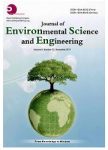Evaluation of Mixing Efficiency in Coagulation-Flocculation Process in Wastewater Treatment
Evaluation of Mixing Efficiency in Coagulation-Flocculation Process in Wastewater Treatment作者机构:Department of Sanitary and Environmental Engineering Budapest University of Technology and Economics (BME) BudapestH-1111 Hungary
出 版 物:《Journal of Environmental Science and Engineering(A)》 (环境科学与工程(A))
年 卷 期:2012年第1卷第7期
页 面:898-903页
学科分类:080603[工学-有色金属冶金] 0817[工学-化学工程与技术] 08[工学] 0806[工学-冶金工程]
主 题:Flocculation kinetics fluid dynamics G-value local mean age wastewater treatment.
摘 要:Fluid flow and mixing phenomenon have a significant impact on coagulation and flocculation processes. Particles dissipating the turbulent kinetic energy increase the efficiency of collision, grow in size and incorporate phosphate from the wastewater Only certain flocks can be separated depending on their stability, size, density, etc.. According to the literature the velocity gradient of the flow (G-value) is the main design parameter of the flocculators, but there is a need to take into account at least the flocks age, too. In this paper, it presents a novel approach to determine the efficiency of flocculators using local mean age theory, residence time distribution and dimensional analysis. Calculations were performed for two constructions of cascade reactors---one with small baffles and one without these; hydraulical performance and the achievable conversion were compared. As a result, the flocculator with small baffles proved to be more efficient than the traditional construction.



